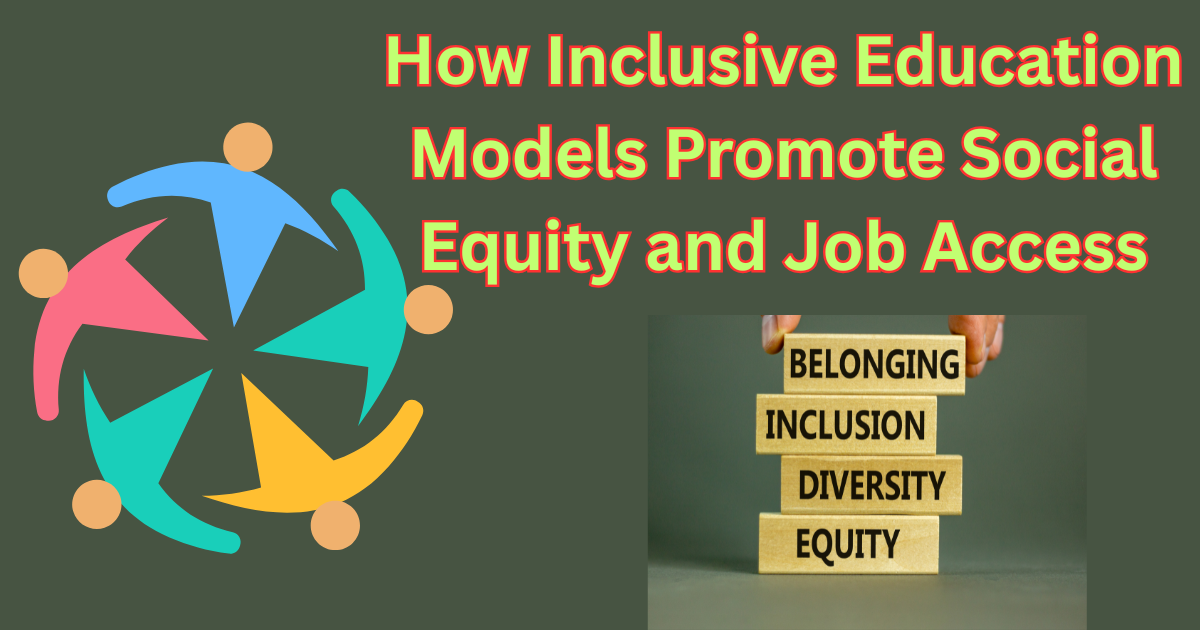How Inclusive Education Models Promote Social Equity and Job Access: Education is valued in the Indian demographics It is considered to be one of the wealthiest things a person can get hold of; it is also believed that it does not come that easily. It requires a lot of patience. In this article, we will delve into the fundamentals of inclusive education, explore its principles, highlight its benefits, anduss how to implement inclusivity in the classroom.
How Inclusive Education Models Promote Social Equity and Job Access
Education is valued in the Indian demographics; it is considered to be one of the wealthiest things a person can get hold of, but it is also believed that it does not come that easily.

Inclusive education has made this education more accessible and acceptable for everyone in this country by making them a part of a society that empowers them. regardless of their social, economic or personal challenges.
It is important to note that such environments make a very big impact on understanding the people who are involved in the journey to make it happen; in an educational setup, this is referred to as ‘learning.
What is inclusive education?
Inclusive education is an education approach that makes sure all the students are involved in the learning process, irrespective of their physical, intellectual or other abilities.
The aim of this approach is to respect diversity, teach young minds the perspective of inclusivity and promote acceptance for diversity.
Will you, when a diverse nation and the world are inherently diverse from every understanding and education system, affect our lifestyle?” When we try to accommodate this diversity in our lives in the form of education, training or household understanding, we promote inclusivity in every form.
Advantages of Inclusive Education
| People | Advantages | How it is beneficial |
| Students | Improved Academic Performance | This is diverse teaching methods address various learning styles, enhancing academic outcomes for all. |
| Enhanced Social Skills | It is interaction with peers of different abilities that fosters empathy, cooperation, and better communication. | |
| Boosted Confidence | The feeling of being valued and included increases self-esteem and motivation. | |
| Teachers | Professional Growth | Teaching diverse classrooms helps educators develop adaptability. |
| Enriched Teaching Experience | Inclusive classrooms are dynamic, inspiring creativity and engagement for teachers in the classroom. | |
| Society | Reduced Discrimination | Inclusion breaks stereotypes and promotes acceptance of diversity in the society. |
| Economic Benefits | A more educated and inclusive workforce boosts economic development and social cohesion. |
Disadvantages to inclusive Education
- Lack of Awareness: People are not aware of the concept of inclusive education, and it is hard to understand.
- Inadequate Training: Teachers often lack the training for inclusivity and other modern education methodologies
- Resource Constraints: Most of the teachers are not getting proper training also because of the economical constraints.
- Rigid Curricula: The curriculum available to the students in the traditional classroom follows a very rigid curriculum with time.
The Role of education in promoting social Inclusion
Education is a factor that contributes to promoting social mobility, as it provides individuals with the skills, knowledge, and abilities required to succeed in life. The role of education promoting social mobility cannot be overemphasised, as it is one of the key drivers of economic growth and development. Education has been described as a powerful tool that can help individuals from disadvantaged backgrounds to break free from poverty and achieve upward social mobility.
- Education as a tool for economic growth: education plays a critical role in promoting economic growth and development.
- Education as a means of breaking the poverty cycle: Education is one of the most effective ways of breaking the cycle of poverty.
- The Impact of Education Quality on Social Mobility: The quality of education provided to individuals also plays a critical role in promoting social mobility.
- The role of early childhood education in promoting social mobility: early childhood education has been identified as a critical factor in promoting social mobility. Children who receive quality early childhood education are more likely to succeed in school and secure better-paying jobs in the future.
Conclusion
In this article we discussed how inclusive education models promote social equity and Job Access: Education is valued in the Indian demographics It is considered to be one of the wealthiest things a person can get hold of.